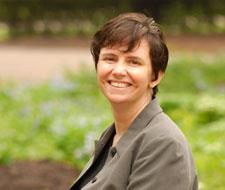

Catherine Kenney doesn't claim to have the answers to the age-old question of how couples should manage and control their money. But this sociologist's research into how various systems of money management affect family life shows that the outcomes can be serious.
Kenney's research is somewhat novel, since data has been scarce. While a graduate student at Princeton, where she received her doctoral degree, she was able to add questions regarding management and control of family income to a large-scale survey administered by Princeton investigators. The survey, "Fragile Families and Child Well-Being," studies about 5,000 children born to mostly non-married couples in large U.S. cities between 1998 and 2000. The study has followed the children from birth to age five, during which time some of the couples have married.
The answers to Kenney's questions revealed that how couples manage their money does matter, particularly for women and children. And earning money did not necessarily equate with controlling income in the household.
According to the survey, some couples keep their incomes completely separate whereas others pool some money to run the household or care for children. Most couples who have children together, whether married or unmarried, pool all their money. These funds are not necessarily shared equally, though, despite the strong belief in U.S. society that married money should be shared. Kenney says the person who earns the most usually has the greatest control.
"It's almost like sharing is this polite fiction that everybody talks about, when in reality it has to do with how much each person earns, and with the right of the wage earner to say what should be done with it."
At the same time, couples who keep their money separately may disadvantage one partner unless they earn equal incomes. Often it is the woman who earns less, says Kenney, and since she often spends her money on the children's clothing and needs even though they should be considered household expenditures, the woman comes up short.
"We are still not addressing the difference gender still has on expectations of whose money goes for what and what gets spent," she says.
As to who controls what money and how, demographics proved revealing. At lower incomes, women tend to have more control over pooled income, where controlling and managing money is not a joy but a burden because couples are trying to make ends meet.
The survey also showed that race can play a major role in how a couple manages their money. African American couples are far less likely than non-Hispanic white couples and Latino couples to pool their money.
What's the best arrangement? The data predicts that couples with equal control stay together and the women fare better financially. But no system is perfect, says Kenney. This same system can put children at risk of going hungry compared with when women control pooled money.


